How to be safe on the Internet
The internet is a staple in many people's everyday lives. It is a great place full of wonderful information, but it is also full of many dangers. The price of banking, shopping, and interacting online might be your personal information. To stay safe on the internet, use the following strategies.
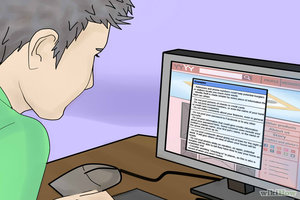 Part 1: Protecting Your Identity
Part 1: Protecting Your Identity
1. Choose strong passwords. Passwords are like the key to your accounts - only the person with the key can access them. When choosing a password, you want to make sure you choose one that is unique, strong, and not easily guessed by strangers or those close to you. Choose a password that uses letters, numbers, lower case, upper case, and characters.
- Choosing password or 1234 is lazy - and easily guessable. Choosing birthdays of those close to you (or yourself) is probably also not safe. The longer your password is, the harder it will be to guess. Also try leaving out letters, or substituting numbers for letters.
- Try passwords that reference phrases or things significant only to you. For example, if the name of your beloved childhood goldfish was Sir Bubbles, swap out some of the letters for numbers and you can end up with a very nice password like s1rbubb735 that only you understand.
- Make sure to choose passwords that are easily remembered or write them down. If you write down your passwords, don't leave them in plain sight. Don't keep them on your computer desk by your computer.
- Never use the same password for different accounts. If you don’t want to come up with and keep track of dozens of different passwords, come up with a base password (ex. s1rbubb735) and tack a logical modifier onto it for each account. For example, on Amazon, use amzns1rbubb735; on Gmail, use gmails1rbubb735 or for Twitter twitts1rbubb735.
- It is good practice to change your password every few months.
2. Be mindful when installing programs or agreeing to terms. When you sign up for newsletters, install programs, or agree to anything, read the fine print. If you do not want to receive junk mail or get put on a telemarketer list, look for a small box near the bottom of the page that asks if you want to receive information and offers from other companies. The best sites will have a statement listed that they will not sell your name to other companies (though they may still send you e-mails themselves).
- Many of these websites can put adware on your computer that tracks your movements and browser habits. Use caution when you come upon those kinds of websites.
- Some sites require you to give all your information to get the product. Only fill in required fields that are marked with an asterisk (*). If the info box does not have an asterisk, it is optional and you can leave it blank.
3. Do not give out personal details to strangers. Don't give your full name, address, or phone number to anyone online that you don't trust or know. This is especially important in chat rooms, when negotiating jobs or deals, or making plans through meet-up sites.
- Be careful when making friends on the internet. Many great friendships can be cultivated through social media, but there are many people who pretend to be someone they are not.
- Practice caution when dating online. Use only your first name, and never give out specific personal details, no matter how great the other person seems. Don't give money to people you have met online. When you finally decide to meet, always meet in busy public places, like a restaurant or coffee shop. Let other people know where you are going, and never let them pick you up or go back to their place.
- Giving personal details to strangers not only compromises your accounts and identity, but your physical safety as well. While most people on the internet may be benign and friendly, you have to be aware of the possibility of people using chat rooms, social media, and other websites to collect information that could lead to physical harm at your place of employment or at home.
- Always check the legitimacy of websites when you shop. If the site has a horrible design or pop ups, it might not be legitimate. Beware of sites that don't allow you to pay through things like PayPal or with a credit card. When shopping on sites like Craigslist, practice caution.
4. Don't fall prey to phishing scams. Phishing e-mails are messages that appear to be from legitimate companies, such as your bank or stores where you've shopped, that provide links to fake websites and ask for personal information.
- Always look at the e-mail address. Many senders of online scam e-mails won't have addresses that match the company they claim to represent. Or the address will be altered slightly so that it might not catch the eye of an unmindful person.
- Beware of phishing e-mail scams claiming to be from eBay, PayPal, a bank, or a company you trust asking for personal or sensitive information. The e-mail may inform you that there is a problem with your account and/or password. There may be a link to click inside. If you get an e-mail like this, don't click on the link. Go directly to the website by typing the URL into your browser.
- Hover your mouse over suspicious links. At the bottom of your screen, you should see the true URL for the website. Many phishing websites will show a different website in the bottom of your browser or beside your mouse when you hover over the link.
- Forward any of suspicious e-mails to the company it claims to be sent from. They will confirm whether the e-mail you received was real or not.
- E-mail programs like Yahoo!, MSN, Hotmail and Gmail will never ask you for your e-mail password. Don't fall for it and give away your password.

5. Keep your eyes peeled for online scams. Online scams crop up everywhere. These scams can pop up in e-mails, tweets, Facebook posts, and many other places. Don't click on links that don't look like a real address or contains a lot of letters and characters that look like gibberish.
- Never click on pop-ups or e-mails that claim you have won millions of dollars. These are scams.
- Don't fall prey to e-mails inviting you to play foreign lotteries. Also beware of e-mails which ask you to help someone transfer large sums of money or inheritances out of their country after giving you a long sad story.
6. Limit the information you share on social media to provide the highest level of social security. Facebook, Twitter, Google+, Instagram, LinkedIn, and other social media sites are part of most people's every day lives. On Facebook, people post their maiden names, their parents' names, their birthdays, the birthdays of their children, their hometowns, their home address, their home and cell phone numbers, along with myriad other personal information. This information gives anyone with a computer just about every essential piece of information about you. Limit what you share online to protect your identity and privacy.
- Sharing too many details on social media sites can put you in physical danger as well. Letting the internet know where you live and when you will not be at home may lead to someone breaking into your house - especially when they see all the photos of your new TV, computers, and jewelry. Too many personal details, like your home address, phone number, and daily whereabouts and habits, gives stalkers plenty of information to use against you.
- Many secure sites, like banking, insurance, loan, and school websites, require security questions. These questions include: "What is your mother's maiden name?", "What is your paternal grandmother/father's name?", "What town did you grow up in?", or "What is your father's birthday?" These answers can be found easily on some people's Facebook pages.
- Sharing this kind of information can result in identity theft.
- When choosing security questions, don't choose ones that have answers easily discovered on social media. Choose harder questions only you know the answer to.
7. Have multiple e-mail accounts. It's best to have three accounts. Multiple e-mails help you separate different aspects of your life, gives you official and non-official addresses, and can help you cut down on spam and privacy issues.
- Have a business e-mail to use for any job-related correspondence. Many times, these are given to your through your place of employment.
- Have a main personal e-mail address. You can use this one for banking, job hunting, insurance, and other official and personal correspondence. This website can also be given to close friends and family members.
- Have a junk e-mail. This e-mail can be the one you use to sign up for things on the internet or at stores, restaurants, or other places you might not want to have your main personal address. You can also use this e-mail on social media sites. If spam comes to this e-mail, it won't affect your daily, main personal e-mail or your business e-mail.
Part 2: Protecting Your Connection
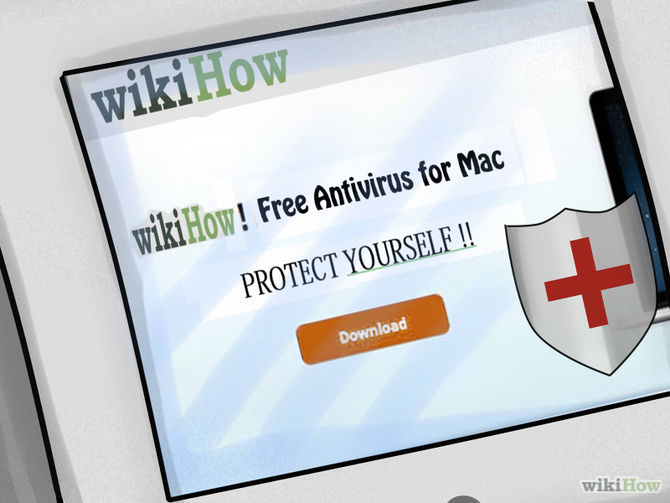
1. Use an anti-virus program, an anti-spyware program, and a firewall. Surfing the internet without these things is unsafe and invites spam, hackers, and viruses onto your computer. Having these safeguards on your computers protects you from things you might not even realize are threats. Make sure to keep them updated to catch the latest threats.
- Trojans, spyware, malware, and viruses can not only make you vulnerable to identity theft and invasions of privacy, but they also can significantly bog down your computer and slow your processor. Anti-virus programs and anti-spyware programs protect your devices from these computer diseases, keeping your system healthy. There are many different programs available to purchase, but there are also many available for free online.
- A firewall is hardware or software that creates a barrier between your network and the outside cyber world, allowing only certain data to cross. You can use either the firewall that comes standard with your operating system or a third-party software program to your liking.
2. Secure your wireless router. Many homes have wireless networks that connect computers, mobile devices, tablets, and gaming systems. Having a wireless network is convenient, but also can leave your devices and information vulnerable.
- Change the name of your router from the default. This name needs to be something unique to you that can't be easily guessed by others.
- Choose a strong password for your router, something not easily guessed by others. Use the same guidelines to choose a password you would for any protected online site.
- Choose WPA2 or WPA security options for your router. They are more secure than WEP.
- Disable guest log in if your router has it. If you want to let friends use your wi-fi, but don't want to give them your password, set up a unique, strong guest password.
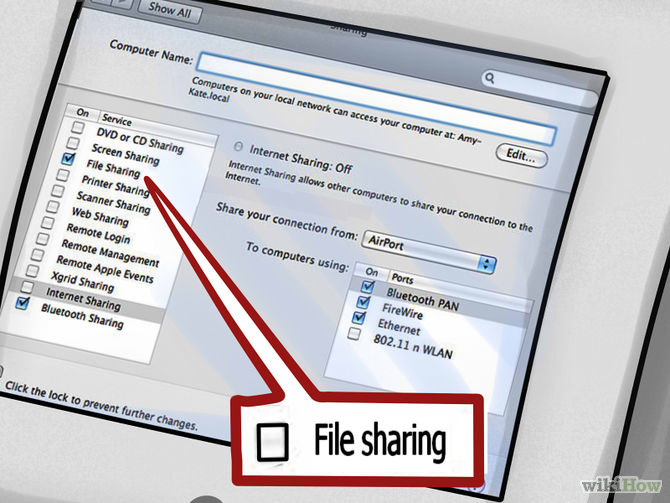
3. Turn off file sharing and network discovery when using a public wireless network. These both put your files and system at risk for being opened by anyone on the wireless network, not just hackers. If you are within range of public wireless networks but don’t need to be online, turn off your wireless capabilities altogether.
- In Windows, these options can be found under Control Panel > Network and Internet > Network and Sharing Center.
- In Mac OS X, they are under System Preferences > Sharing.
- On some devices, there is simply an on/off switch for wireless; on others, you will need to configure this yourself (ex. on a Mac, click the Wi-Fi icon and turn off AirPort).
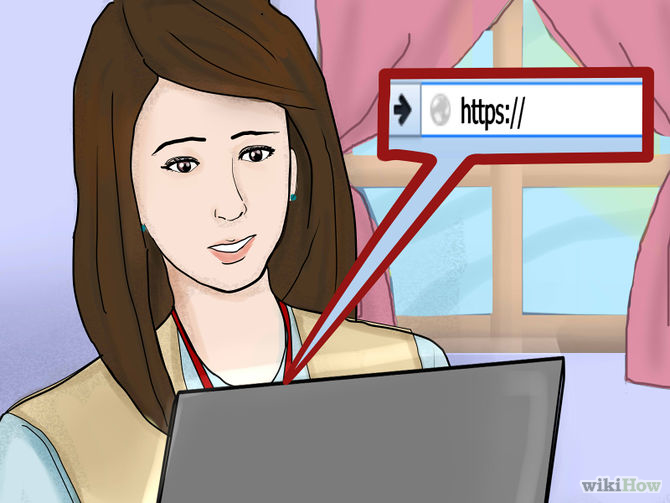
4. Always check for secure transaction info. The best companies will have many security devices in place. You may see a gold lock at the bottom of the page to indicate a secure site. When giving any bank details or other information, make sure the connection is secure.
- Secure URLs begin with https:// instead of http://. This means the transmission is encrypted to and from the web server.
- Even if the connection is secure, still be mindful of what sites you are using. Not every site which runs HTTPS or accepts payments is trustworthy, even if the connection is. If you don't know anything about the site, do research first.

5. Download files from trusted sources. When downloading files or software, only download from sites that have been rated or verified by trusted sources. Choose downloading resources that are upfront about price and ratings and vet their downloads (ex. download.cnet.com).
- Beware of extra downloads. Sometimes when you download free software, like a game, an app, or even a browser, the download link contains browser toolbars and other unwanted add ons. When downloading a free program, always choose "custom installation." This allows you to unclick additional programs to install, like toolbars and add ons. Uncheck or deselect anything unfamiliar the site wants to download onto your computer.
- When in doubt, google the name of the site or download along with the word “scam” to see if you get any hits.
- Do not download illegal copyrighted material without paying for it.
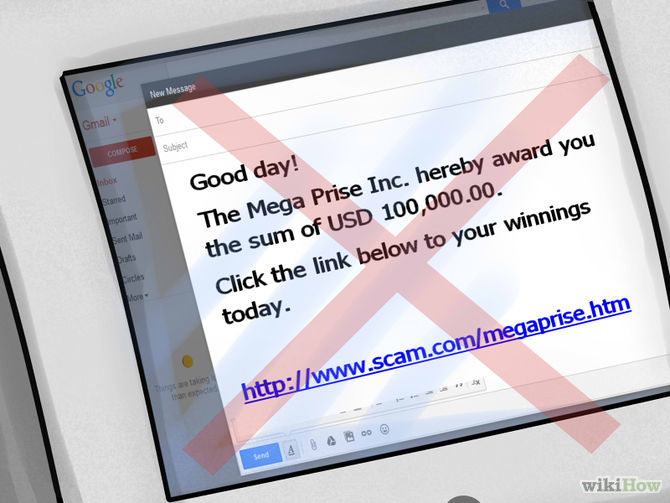
6. Do not open e-mail attachments. Unless you know that a friend is sending you a .doc, .pdf, or other file to view, don't open the attachment. Some junk e-mails may contain viruses or spyware that can harm your computer. These e-mails may be automatically marked as "spam" or "junk," but virus-ridden emails from unwitting friends can also slip through.
- Avoid e-mails with file attachments ending in ".exe" extensions.
- If you use an email program like Outlook or Thunderbird, you can disable attachment previews. These take away your ability to decide whether or not to open an attachment. Look through your email program’s settings and disable options such as Show Attachment Previews, Display Attachments Inline, etc.
Tips
- Never ever share your password.
- There are some sites where you need to provide accurate information, like online banking or insurance companies. There are other sites that really have no business asking for your age or address. You can create an alias with a birthday that is not yours and address that is fictitious for these sites. If that site gets hacked, the information is useless to the hackers.
- Never click on pop ups; some people can steal your identity and information through this method, or you can unwittingly put adware or viruses on your computer.
- Use good hints with passwords and security questions that only you will know the answer to.
Warnings
- If your computer was hacked, then all your information may have been compromised. Update your virus protection software and remove the virus. If important documents and information were stolen or compromised, inform your bank or job accordingly. Report any crime to the police.
- Keep a backup of important emails and documents on a USB flash drive, in print, or both.
- Give up your account if it has been compromised after you backup what you can save. Inform your bank, job, and others of these changes immediately. You will probably have to change all the passwords or account numbers immediately if it was in your email. Report the problem to your email provider.
- There is no real privacy online. If you want something to stay private, don't post it.
Axarhöfði 14,
110 Reykjavik, Iceland














